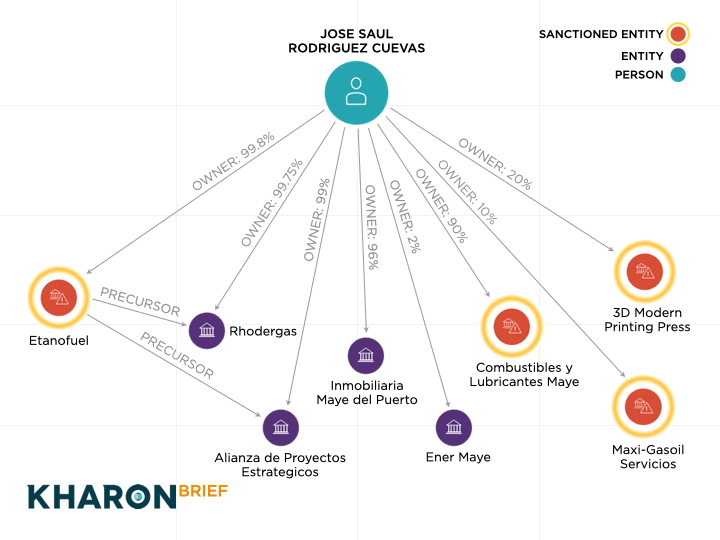The United States designated eight Latin American drug cartels as foreign terrorist organizations (FTOs) last week, an escalation that places them on the same legal footing as al-Qaida, ISIS, Hizballah and Hamas.
The Treasury Department already had sanctioned seven of the eight cartels under different authorities, so the FTO designations don’t fundamentally change the compliance landscape for companies with business in Latin America.
But the designations do signal a major prioritization by the Trump administration, which is redirecting law enforcement agencies and resources to address the cartels’ “unusual and extraordinary threat.”
The details: The designated organizations are Tren de Aragua (TdA), Mara Salvatrucha (MS-13), and six Mexican cartels: Cártel de Sinaloa, Cártel de Jalisco Nueva Generación (CJNG), Cártel del Noreste (CDN), La Nueva Familia Michoacana (LNFM), Cártel de Golfo (CDG), and Cárteles Unidos (CU).
The primary commercial risk lies in providing “material support” to FTOs. According to the State Department’s definition, that can include financial services, lodging, facilities, training, advice, weapons, personnel or transportation. U.S. citizens are prohibited from materially supporting FTOs, as are non-U.S. citizens while they’re in the United States. U.S. banks also are required to freeze FTO assets.
Many of these measures were already in place through previous Treasury sanctions for drug trafficking or transnational crime. However, providing material support to a designated FTO carries more severe criminal penalties, such as increased jail time and fines.
Backstory: The State Department previously had listed just two Latin America-based groups, both from Colombia, as FTOs: Segunda Marquetalia and the Revolutionary Armed Forces of Colombia (FARC).
Many large cartels and organized crime groups in Latin America are deeply integrated into regional and national economies, with extensive commercial networks that often extend into the U.S., where drugs are trafficked and sold. To operate, these networks rely on a range of commercial services—including transportation, communications, banking, warehousing and lodging—whose provision would constitute material support.
Case study: CJNG, one of the newly designated Mexican FTOs, plays a central role in the trafficking of fentanyl, heroin and methamphetamine, which has fueled the opioid crisis in the U.S. The Treasury designated it in 2015 as a foreign drug trafficker under the Kingpin Act.
Operating in 28 Mexican states and expanding its influence into the U.S., CJNG has laundered millions through complex financial schemes across the tourism and oil industries. It also utilizes sanctions evasion tactics.
In September 2024, the Treasury sanctioned Ivan Cazarin Molina, a founding senior member of the cartel, along with his figurehead, Jose Saul Rodriguez Hernandez, for leading a network of businesses trading stolen fuel that has generated tens of millions of dollars for CJNG.
A Kharon investigation found that Hernandez’s companies have continued operating by rerouting ownership and management through his non-sanctioned family members:
The Treasury Department already had sanctioned seven of the eight cartels under different authorities, so the FTO designations don’t fundamentally change the compliance landscape for companies with business in Latin America.
But the designations do signal a major prioritization by the Trump administration, which is redirecting law enforcement agencies and resources to address the cartels’ “unusual and extraordinary threat.”
The details: The designated organizations are Tren de Aragua (TdA), Mara Salvatrucha (MS-13), and six Mexican cartels: Cártel de Sinaloa, Cártel de Jalisco Nueva Generación (CJNG), Cártel del Noreste (CDN), La Nueva Familia Michoacana (LNFM), Cártel de Golfo (CDG), and Cárteles Unidos (CU).
The primary commercial risk lies in providing “material support” to FTOs. According to the State Department’s definition, that can include financial services, lodging, facilities, training, advice, weapons, personnel or transportation. U.S. citizens are prohibited from materially supporting FTOs, as are non-U.S. citizens while they’re in the United States. U.S. banks also are required to freeze FTO assets.
Many of these measures were already in place through previous Treasury sanctions for drug trafficking or transnational crime. However, providing material support to a designated FTO carries more severe criminal penalties, such as increased jail time and fines.
Backstory: The State Department previously had listed just two Latin America-based groups, both from Colombia, as FTOs: Segunda Marquetalia and the Revolutionary Armed Forces of Colombia (FARC).
Many large cartels and organized crime groups in Latin America are deeply integrated into regional and national economies, with extensive commercial networks that often extend into the U.S., where drugs are trafficked and sold. To operate, these networks rely on a range of commercial services—including transportation, communications, banking, warehousing and lodging—whose provision would constitute material support.
Case study: CJNG, one of the newly designated Mexican FTOs, plays a central role in the trafficking of fentanyl, heroin and methamphetamine, which has fueled the opioid crisis in the U.S. The Treasury designated it in 2015 as a foreign drug trafficker under the Kingpin Act.
Operating in 28 Mexican states and expanding its influence into the U.S., CJNG has laundered millions through complex financial schemes across the tourism and oil industries. It also utilizes sanctions evasion tactics.
In September 2024, the Treasury sanctioned Ivan Cazarin Molina, a founding senior member of the cartel, along with his figurehead, Jose Saul Rodriguez Hernandez, for leading a network of businesses trading stolen fuel that has generated tens of millions of dollars for CJNG.
A Kharon investigation found that Hernandez’s companies have continued operating by rerouting ownership and management through his non-sanctioned family members:

Kharon users can explore this Insight in greater detail through the ClearView platform.
Etanofuel, which advertises itself as a “pioneer in the sale and production of ethanol, bioethanol and biodiesel,” was one of 11 gas station companies in Molina’s network that the Treasury Department targeted.
But Cuevas also owns two non-sanctioned companies that were once merged with Etanofuel, and he holds a stake in an additional five companies across the Mexican state of Veracruz.
But Cuevas also owns two non-sanctioned companies that were once merged with Etanofuel, and he holds a stake in an additional five companies across the Mexican state of Veracruz.

Question we’re watching: The White House declared a national emergency to combat the cartels, and a counterterrorism response means more U.S. resources and government attention. Will that increased focus provide a means for strengthening U.S. cooperation with Mexico, or will ramped-up enforcement efforts exacerbate already existing tensions?
The bottom line: The FTO designations aren’t totally new territory from a compliance standpoint. But cartels’ networks can obfuscate their connections, and their evasion tactics may also evolve in response to the designations and the extra scrutiny that comes with them.
As U.S. government efforts ramp up, questions of collaboration with other governments as well as with the private sector loom large.
Read more:
The bottom line: The FTO designations aren’t totally new territory from a compliance standpoint. But cartels’ networks can obfuscate their connections, and their evasion tactics may also evolve in response to the designations and the extra scrutiny that comes with them.
As U.S. government efforts ramp up, questions of collaboration with other governments as well as with the private sector loom large.
Read more:







